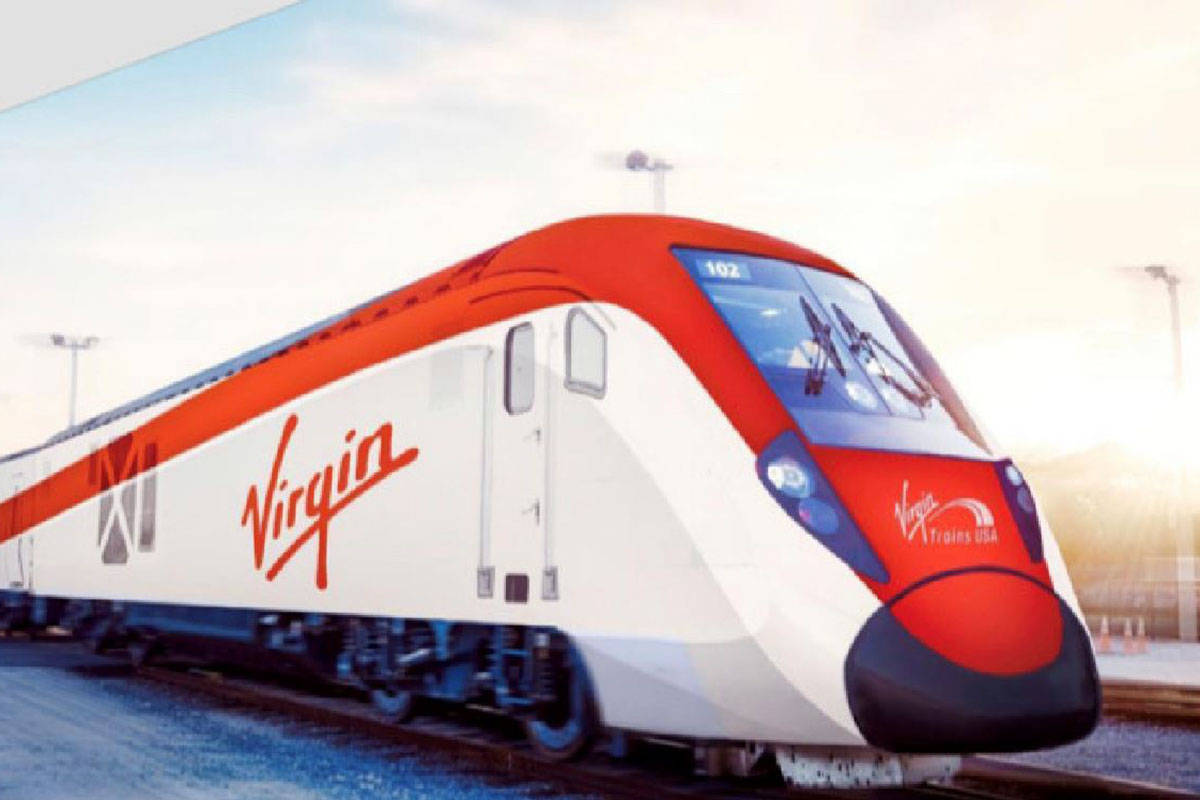Virgin Trains looking to get rail passengers to Allegiant Stadium

As plans for a high-speed train between Las Vegas and Southern California push ahead, officials are looking at how to incorporate Allegiant Stadium into the Southern Nevada portion.
During an online symposium Thursday, Virgin Trains spokesman Ben Porritt said the company is working to create Raiders game specific rides much like it does in Florida for the NBA, with trains leaving 30 minutes after the final buzzer.
“We created a train for the Miami Heat called the Buzzer Beater and we rearranged train schedules on game day,” Porritt said. “Those are the type of creative things that we’ll do with the NFL schedule, and certainly if they’re playing a ‘Monday Night Football’ game or an early game on Sunday or a late game on Sunday, we’re going to work that out with the schedule and make sure it works for as many people as needed.”
The $4.8 billion project would establish high-speed rail service between the Victor Valley area and Las Vegas, with trains traveling at speeds up to 200 mph completing the 180-mile trip in approximately 90 minutes. The tracks would run in between the northbound and southbound lanes of I-15 through California, shifting to the east side of the freeway in Nevada.
Work is being done to bridge the transportation gap between when travelers arrive at the planned Las Vegas station — slated to be constructed on Las Vegas Boulevard between Warm Springs and Blue Diamond roads — and the stadium for game and event days.
“Those conversations are happening, too,” Porritt said. “Those are the kinds of things that we want to focus on, that first and last mile. We’re bringing a mobility officer who for the next three years, the only thing they’re going to focus on is how to get people from our stations to where their final destination is. … There is no doubt getting people to the places that matter, Allegiant Stadium and elsewhere, we’re going to be focused on that over the next three years.”
Multiple options
Multiple transportation options will be presented to passengers once they arrive in Las Vegas to get them to their point of interest, including ride-hailing services. The station is also planned to sit across the street from a park and ride shuttle site for Allegiant Stadium.
The Raiders, who are scheduled to kick off their 2020 season at Allegiant Stadium, declined to comment on the possible service.
Virgin Trains data shows that 50 million one-way trips occur between Southern California and Las Vegas each year, with 85 percent of those trips being by bus or personal vehicle. At full operation, Porritt said, the company hopes to capture about one-fifth of that traffic on its trains.
“It gives you a car-free option. It reduces traffic congestion and air pollution,” he said. “When we get to full operations, full stabilization of this route, our expectation is that we will be able to capture about 20 percent of this market, which is 10 million one-way trips.”
Trains are scheduled to travel once every hour at the projected launch of the service in 2023, with service levels expected to rise with ridership in the future, Porritt said. Each train set will have a capacity of up to 600 passengers.
“We’re building this asset to last for 100 years,” Porritt said. “We’re building the infrastructure that will allow us to run trains every 25-30 minutes.”
Bond update
A California finance committee last month unanimously approved the allocation of $600 million in tax-exempt bonds to go toward the Virgin Trains project, formally known as XpressWest.
Internal Revenue Service guidelines allow Virgin to market up to four times the amount of the $600 million in bonding authority, for a total of $2.4 billion in tax-free, private equity bonds.
Virgin Trains in March also secured $1 billion in tax-free private bonds for the project from the U.S. Department of Transportation.
The final step to get the long-talked-about train project moving is for Nevada to approve $200 million in bonds from the state’s debt limit allocation, which would allow Virgin to market $800 million in bonds toward the project. If approved, construction is on track to break ground later this year.
Terry Reynolds, director of the Nevada Department of Business and Industry, said Thursday it’s unlikely the decision will come down until later in the summer.
“I doubt it will happen in June and they usually don’t have a board of finance meeting in July, that’s not saying there couldn’t be one,” Reynolds said.
Nevada is still waiting on various approvals before issuing its decision on the tax-free bonds, including a final environmental determination by the Federal Railroad Administration and agreements with the Nevada Department of Transportation. The NDOT agreement is expected to be done sometime within the next week or so, according to Reynolds and the FRA finding of fact in the near future.
Despite the waiting game, Reynolds said the likelihood of the bonds being approved looks good, especially after the USDOT signed off on the $1 billion in tax free bonds in March.
“They’re (Virgin) making good progress. The federal transportation has allocated a significant amount to them and that’s a sign that the Federal Railroad and Federal Transportation (commissions) support the project,” Reynolds said. “So I think that’s good news for them. We just have to complete our steps here in Nevada.”
Contact Mick Akers at makers@reviewjournal.com or 702-387-2920. Follow @mickakers on Twitter.